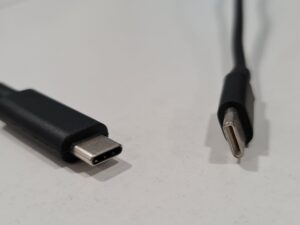
Back in September of last year, we reported on a published paper regarding a USB-C 2.1 port revision, capable of achieving peak wattage transfers of 240W. Back then, it was unclear when the port would be available. Last week, however, the world got its answer.
The availability of the new 240W-capable USB-C cables were first discovered by Tom’s Hardware, being sold by Club3D, a small Dutch retailer. On the company’s official Facebook page, it lists three variations of the cable: two of them were capable of transmission of power, data, and video at speeds up to 40Gbps, while the third cable’s data transmission was considerably slower at 480Mbps. Basically, USB 2.0 speeds.
As it stands, USB-C cables that are more readily available today are capable of reaching 100W through a single cable, which is more than sufficient to charge most of today’s smartphones, tablets, and laptops that support 100W charging via USB-C.

That being said, it is important to note that, while these 240W cables are now available, 3rd party chargers capable of achieving the same power output is less common at the moment. On top of that, using the cables on 100W-capable adapters doesn’t mean that they’ll automatically be accommodating to said cables and start churning out that sort of wattage, for very obvious reasons. And while they are still not as common, this availability will clearly open the path to wider adoption of 240W-capable USB-C cables.
Getting back to Club3D’s offering, there still isn’t an official price tag available for the cables, nor their availability in a retail capacity. Of course, when they do become more widely available and those among you wish to become first adopters, you’ll want to keep an eye out for the Extended Power Range (EPR) specification on the 240W USB-C cables. It is this specification that indicates if the cable is capable of delivering 48WV at 5A or 240W.
(Source: Tom’s Hardware, PCGamer)
The post 240W USB-C Cables Are Finally Here appeared first on Lowyat.NET.
